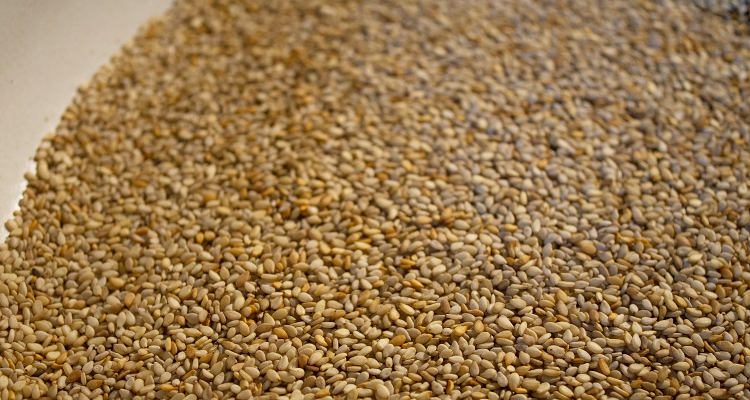
I’m willing to bet if I ask you if sesame seeds are part of your diet, I’d get a very sarcastic response: “Yeah, if they are on my bagel!”
There are actually many ways to reap the benefits of sesame seeds, which are healthier than your bagel. I guess opposites attract, right? The consumption of wheat products can lead to various health problems, including obesity, digestion issues, and heart disease. On the other hand, sesame seeds are considered a symbol of immortality (well, according to Hindu legends).
It is amazing how versatile sesame seeds can be, when you think about it. They are flat and oval shaped and come in many colors, including white and shades of grey, brown, red, black, and yellow. Lighter ones are roasted and unroasted by being hulled, which means the bran portion is removed. Unhulled seeds have their bran intact, while appearing darker in color.
You can also find sesame seeds in tahini, which is a Middle Eastern sesame seed paste that can commonly be found in hummus or baba ghanoush. Asian sesame pastes are also created from toasted sesame seeds. It is a good idea to sprinkle toasted sesame seeds on top of salads, granola, or also Asian vegetable dishes. You also create sesame bars with these healthy seeds. Sesame seed oil is also great for salad dressings.
Sesame seeds are also a very good source of copper and manganese. The benefits of sesame seeds also provide good sources of tryptophan, calcium, magnesium, iron, phosphorus, zinc, vitamin B1, and fiber. Sesame seeds and sesame seed oil are also good sources of the essential fatty acid, omega-6 (linoleic acid). The seeds also contain some omega-3 (alpha-linolenic acid) as well.
5 Benefits of Sesame Seeds
1. Lower Blood Pressure
There have been animal studies linking sesame seeds to lower blood pressure with the help of the seeds’ lignan phytonutrients, sesamin and sesamolin. Although sesame seeds are more nutrient-rich than sesame oil, it is interesting what occurs during the making of the oil. Studies show that the phytonutrients, episesamin and sesaminol, created during sesame oil production help lower blood pressure.
2. Reduce Inflammation
There are many nutrients contained within sesame seeds, which provide anti-inflammatory properties. The sesamin and sesamol found in sesame seeds help slow down the delta-5-desaturase enzyme, which creates arachidonic acid from omega-6 fatty acids. Arachidonic acid is a precursor from molecules that support inflammation.
One cup of sesame seeds amounts to 74% of your daily value intake of copper, which has an important role in inflammation reduction. It assists in the enzyme activity of lysyl oxidase, which is known to join collagen and elastin. Those substances are essential by giving elasticity, strength, and structure to bones, joints, blood vessels, and skin.
3. Essential for Bone Health
Phosphorus and zinc are two minerals that support the integrity of the bone. In a quarter cup of sesame seeds, you’ll get 22.6% of your daily value intake of phosphorus and 18.7% of zinc. Also, the combination (of zinc, copper, and manganese in sesame seeds) helps the construction of the bone matrix. There is a clear correlation between osteoporosis at the hip and spine and low dietary intake and low blood levels of zinc, according to a study.
4. Lowers Cholesterol
There are 257 mg of phytosterols found in a quarter cup of sesame seeds. The chemical structure of phytosterols is very similar to cholesterol. When large amounts of phytosterols are in your diet, it can help reduce blood levels of cholesterol.
5. Prevents Disease
There is a good amount of calcium in sesame seeds, containing 351 mg and 35.1% of you daily intake in just one cup. Studies have linked calcium to help protect colon cells from cancer-causing chemicals. Calcium can also prevent bone loss that often occurs as a result of menopause or rheumatoid arthritis. If you suffer from migraine headaches or PMS, calcium can help reduce your symptoms.
When your diet includes these tiny seeds, you will surely reap the benefits of sesame seeds. Eating healthy will be made easy when you sprinkle sesame seeds all over your diet. Enjoy all the sesame seed options today!
Sources:
Erasmus, U., Fats that Heal, Fats that Kill (Summertown: Alive Books, 1993), 237-238.
Mateljan, G., The World’s Healthiest Foods: Essential Guide for the healthiest way of eating (Seattle: George Mateljan Foundation, 2007), 516-521.
“Sesame seeds,” The World’s Healthiest Foods web site; http://www.whfoods.com/genpage.php?tname=foodspice&dbid=84.
Krishan, S., “8 Super Health Benefits of Sesame Seeds,” Care2 Healthy Living web site, Feb. 12, 2014; http://www.care2.com/greenliving/8-super-health-benefits-of-sesame-seeds.html.













